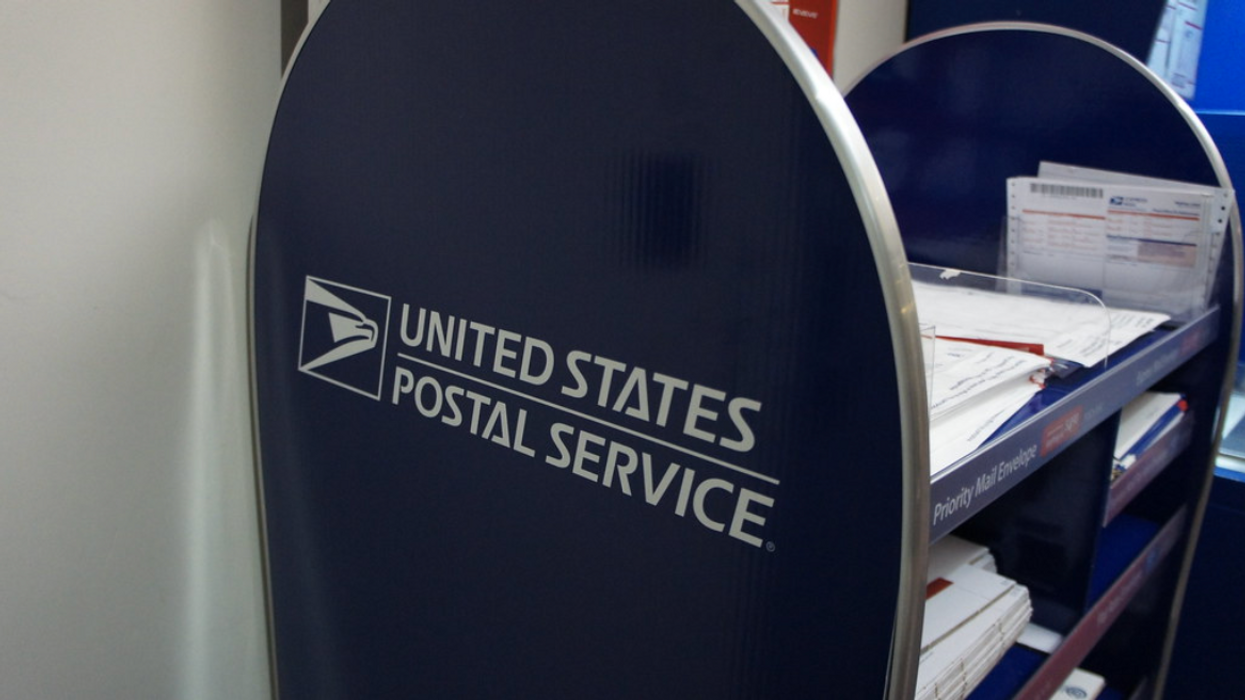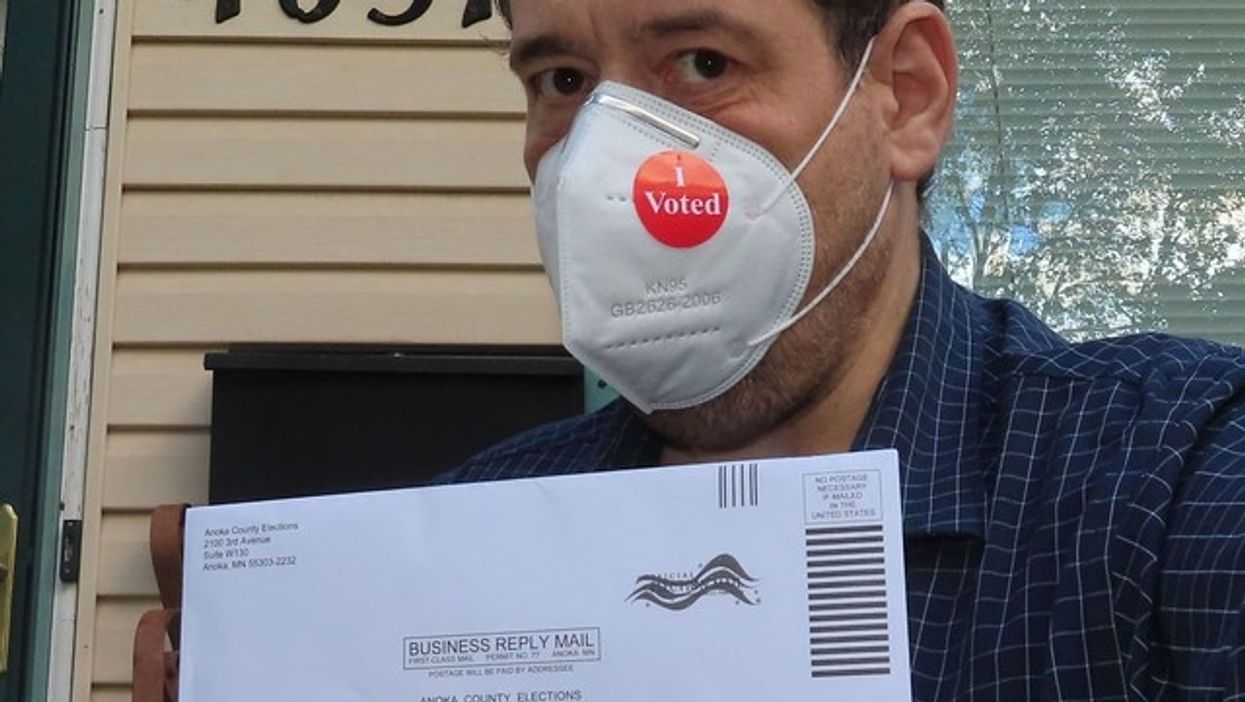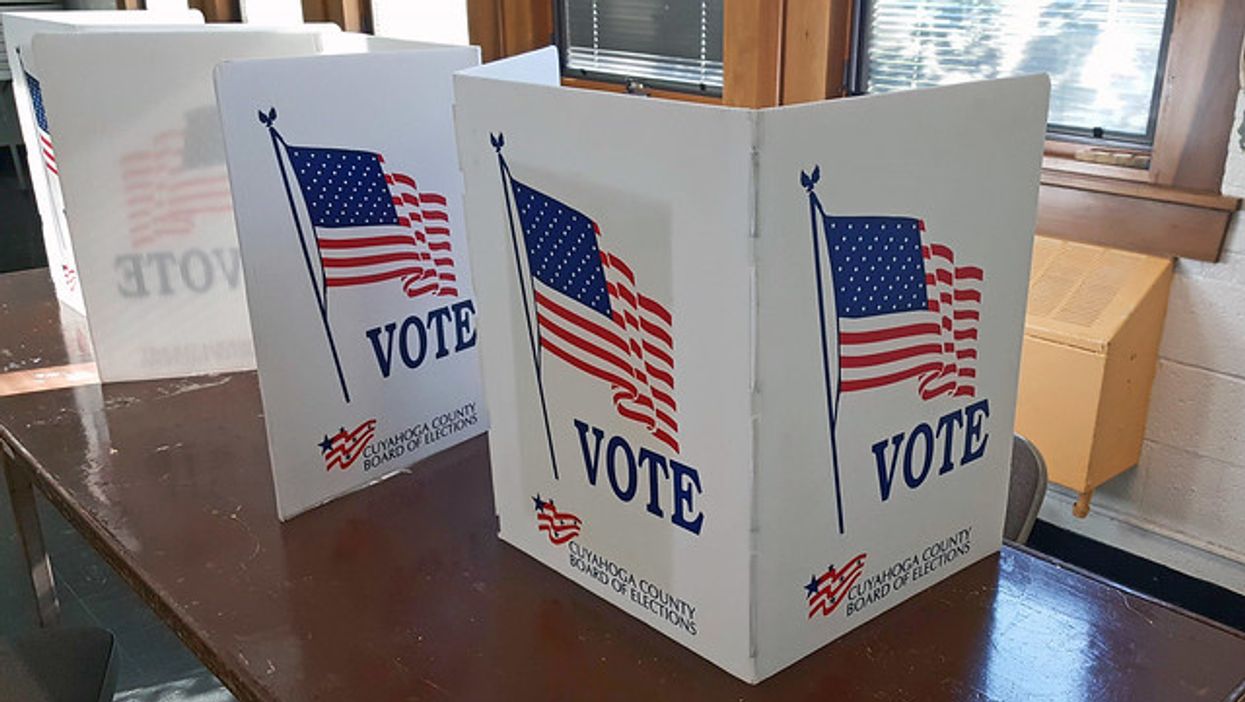You may need to bring your mail ballot to the polling place or election office and hand it to election workers to have it voided, or destroy it yourself, and you might be required to sign an affidavit stating that you did not already vote by mail.
However, many election officials across the country encourage mail voters to stick with their original voting plan. “I encourage people who have received an absentee ballot to go ahead and vote that ballot," said Jason Hancock, Idaho's deputy secretary of state. “Spoiling ballots and issuing new ones adds to the cost and administrative burden of running an election and may slow down the voting process for anyone behind the voter in line at the polls." With a week to go until Election Day, voters can still deliver mail ballots to county or town
drop-box locations.
When you arrive at the polling place or voting site, it's possible that poll workers may be able to consult a database to see if you returned a mail ballot, but such systems are not in place everywhere. Be prepared to explain your situation, and it's a good idea to bring your mail ballot with you just in case.
State-by-State Guide
These guidelines can change, and there can be important differences in each county or town, and differences between early voting and Election Day. Check with your
local election office to confirm the procedure in your area before showing up to vote.
If your experience differs from the advice below, let us know — and be sure to sign up with our Electionland project to
alert us if you experience any problems at the polls.
Alabama
You should expect to cast a provisional ballot.
Alaska
According to the
Division of Elections, “You should destroy and dispose of your absentee ballot if you choose to vote in-person."
Arizona
You should expect to cast a provisional ballot.
Arkansas
If you take your absentee ballot packet to the county clerk's office and have it “spoiled," you can cast a regular ballot in person. “If they do not have the packet, they would have to vote a provisional ballot until the County Board of Election Commissioners can ascertain if the other ballot came back," said Chris Powell, press secretary for the Arkansas secretary of state.
California
If you didn't receive the mail ballot, don't have it with you or election officials cannot verify that you haven't already returned it, you will vote a
provisional ballot.
Colorado
Coloradans have voted primarily by mail since 2013, but if you don't have your mail ballot, you can still
vote in person.
Connecticut
As long as you haven't already returned your mail ballot, you can vote in person, but you should dispose of the unused mail ballot, said Gina Atanasoff, press secretary for the secretary of state.
Delaware
According to the
Department of Elections: “When you arrive at your polling place, an election officer (poll worker) will confirm via the pollbook that your Vote By Mail (VBM) ballot has not been returned to the Department. Your unreturned VBM ballot will be voided, and you will be allowed to vote in person at the polling place."
District of Columbia
All registered voters were sent a mail ballot. According to the
Board of Elections: “You can dispose of the ballot for the 2020 General Election you received in the mail. We will provide you a ballot at the Vote Center." You can also bring your ballot with you and have poll workers dispose of it.
Florida
If you have the mail ballot,
bring it with you to the polls. Poll workers will cancel it and direct you to cast a regular ballot. If you do not have the mail ballot, they will check if the elections office has received it before allowing you to vote. If they cannot confirm if you returned the mail ballot, but you have not already voted, you can still cast a provisional ballot.
Georgia
According to the
secretary of state: “If you do not receive your absentee ballot after submitting your application, contact your county registrar to assess your options. If there is not enough time to receive a new absentee ballot, or if for any reason you cannot have another sent to you, you may vote in person. If you attempt to vote in person because you never received a requested absentee ballot, you will have to sign a document attesting that you are only voting once. If you request and return an absentee ballot, you cannot change your mind and vote in person. Once you return your absentee ballot, you have voted."
Hawaii
All active registered voters were mailed ballots, but if you prefer to vote in person, you may do so at any
voter service center in your county.
Idaho
If time permits, bring your mail ballot to the county clerk's office before Election Day to have it spoiled, Deputy Secretary of State Jason Hancock said. Otherwise, bring it to the polls to have it spoiled by a poll worker, who will give you a new ballot to vote in person.
Illinois
According to the
Board of Elections: “If you have already received your mail ballot, take it with you to an early voting site or your polling place on Election Day and surrender it to an election judge. Your mail ballot will be voided, and you will receive a regular ballot. If you have not yet received your mail ballot, you will be asked to sign an affidavit certifying you have not received your ballot. You will then be issued a regular ballot. If you received your mail ballot but lost it, you may sign an affidavit certifying you have not yet voted in this election. You will then be issued a provisional ballot."
Indiana
If you have the mail ballot, surrender it to a poll worker to vote a regular ballot. If you never received the mail ballot, sign an
affidavit at your polling location to vote a regular ballot. If you sent in your completed mail ballot but it was rejected, go to the county election board before 5 p.m. on Election Day to request an ABS-21 form and then go to your polling place to vote, according to the Election Division.
Iowa
According to the
secretary of state, “If you have not returned your absentee ballot on Election Day, you have the following options: Deliver your voted absentee ballot to the county auditor's office before the polls close on election day, surrender your voted absentee ballot at the polls and vote a regular ballot, or vote a provisional ballot at the polls if you cannot surrender your voted absentee ballot."
Kansas
You should expect to cast a
provisional ballot.
Kentucky
You can vote in person if you did not receive your mail ballot by Oct. 28. According to the
Emergency Administrative Regulation issued for the Nov. 3 elections, “If a voter has requested, but not received their absentee ballot by October 28, 2020, the voter may appear at a county polling location to vote in person." Your application for an absentee ballot will be canceled in the system, and you'll sign an oath before voting.
Louisiana
According to the
secretary of state: “You can vote in person during early voting or on Election Day as long as you have not returned your absentee ballot to the registrar of voters. Simply destroy your absentee ballot after you have voted in person during early voting or on election day."
Maine
If voters received an absentee ballot, “they need to vote it or visit their clerk to return it and be removed from the absentee voter list. Voters will not be eligible to receive a second ballot to vote in-person absentee ahead of Election Day if they have already received one at home," said Kristen Schulze Muszynski, director of communications for Maine's secretary of state. For further details, see the
state's guidance on absentee voting. Though the state discourages voters from “wasting their absentee ballot," Muszynski said if a voter shows up on Nov. 3 and has not already submitted an absentee ballot, they will be allowed to cast a regular ballot in person. “If people plan to do this, we do ask that they return their absentee ballot to the clerk ahead of Election Day. They should not expect to bring their ballot to the polls and cast it then."
Maryland
You should expect to cast a
provisional ballot.
Massachusetts
According to the
secretary of the commonwealth: “You can vote in person as long as you haven't already voted by mail. If you choose not to return your mail-in ballot, you can vote in person on Election Day or during early voting. You can also vote in person if you mail your ballot and it does not reach your election office by Election Day or if your mail-in ballot is rejected for any reason."
Michigan
Bring your mail ballot to your precinct polling location on Election Day to
“surrender" it for a new in-person ballot. If your ballot was lost or destroyed, you can sign a statement to that effect and vote at your precinct polling location.
Minnesota
According to the
secretary of state: “As long as your absentee ballot hasn't been counted by your election officials, you may still cast a ballot in person by voting in your polling place on Election Day or at your local early voting location. You can track the status of your absentee ballot to see when it is sent to you and when it is received by election officials. After voting in person, the unique ballot ID number on your original absentee ballot will be invalidated, so that if it is returned to the election office the officials will not count it. If you plan on voting in person, please do not bring your absentee ballot with you. Your election official will provide you with a new ballot to complete that day."
Mississippi
You should expect to cast an
affidavit ballot.
Missouri
Contact your
local election authority.
Montana
Most counties are holding this election primarily by mail, with ballots sent to all active registered voters; others are holding a polling-place election, with the option to request an absentee ballot. For guidance on how to vote in person in a mail-election county or if you requested an absentee ballot in a polling-place election county, contact your
county elections office.
Nebraska
You should expect to cast a provisional ballot.
Nevada
All active registered voters were mailed a ballot. “Voters who choose not to vote by mail are welcome to vote in person by surrendering their mail ballot or signing an affidavit saying they will not/have not voted their mail ballot," said Jennifer Russell, public information officer for the Nevada secretary of state.
New Hampshire
You may vote a regular ballot at the polls as long as you have not already returned your voted mail ballot. Destroy the unused mail ballot.
New Jersey
New Jersey is conducting this election primarily by mail for the first time. If you prefer to
vote in person, you may go to your polling location on Election Day and cast a provisional ballot.
New Mexico
You may
vote in person at your polling place after signing an affidavit stating that you did not and will not vote your mail ballot. If your absentee ballot didn't arrive, you can also pick up a replacement absentee ballot at your polling place on Election Day.
New York
You may
vote in person during early voting or on Election Day.
North Carolina
According to the
State Board of Elections: “You may still vote in person as long as you did not return your absentee ballot. Your absentee ballot will be spoiled after you vote in person. You may simply discard your absentee ballot — there is no need to bring it with you to a polling place."
North Dakota
To vote in person, bring your unused mail ballot to the poll where it will be voided by an election worker. If you don't have it with you, you can still vote in person as long as you did not already submit the voted mail ballot.
Ohio
During early voting, you can vote a regular ballot in person, according to a directive from the
secretary of state. Officials request you bring your absentee ballot to have it spoiled, but if you don't, you will still be allowed to vote. If you wait until Election Day, however, you should expect to cast a provisional ballot.
Oklahoma
Destroy your absentee ballot and accompanying materials. Before voting at the polling place or early voting site, you will sign an affidavit stating you did not vote the mail ballot you requested.
Oregon
“We have been entirely vote by mail for over 20 years," said Andrea Chiapella, legislative and communications director for the Oregon secretary of state. “We don't have polls, but I could go to my county election office and vote my ballot using a privacy booth if I wanted to."
Pennsylvania
According to the
Pennsylvania Department of State: “If you did not return your mail-in or absentee ballot and you want to vote in person, you have two options: Bring your ballot and the pre-addressed outer return envelope to your polling place to be voided. After you surrender your ballot and envelope and sign a declaration, you can then vote a regular ballot. If you don't surrender your ballot and return envelope, you can only vote by provisional ballot at your polling place. Your county board of elections will then verify that you did not vote by mail before counting your provisional ballot."
Rhode Island
You should expect to cast a
provisional ballot.
South Carolina
According to the
South Carolina Election Commission, “You must first return the unvoted absentee ballot to the county voter registration office or extension office before voting in person."
South Dakota
Voters “are directed to not vote the ballot they received in the mail and may go visit their county auditor up until November 2nd or vote at their polling location on Election Day," said Rachel Soulek, public information specialist for the South Dakota secretary of state's office. “They do not need to bring the ballot with them. They should destroy the ballot."
Tennessee
You should expect to cast a provisional ballot. “If a person submits a request for a by-mail ballot, the person should have voted and returned that ballot by-mail by Election Day," said Julia Bruck, director of communications for the Tennessee secretary of state. “However, if there is an issue with someone not receiving their ballot in time to cast the by-mail ballot, there is a safe harbor for voters. The person can vote a provisional ballot. The provisional ballot will only be counted if the by-mail ballot has not been received or not been counted."
Texas
You can bring your mail ballot to the poll or early voting site, surrender it and then vote a regular ballot. If you do not have the mail ballot when you come to the polls, you can cast a provisional ballot.
Utah
All active registered voters were automatically mailed ballots. According to the
Utah Elections Office: “If you receive a mail ballot but prefer to vote in person, please bring your mail ballot to the polling place to 'surrender' it when you vote. While this is not required, it helps your local elections officials process ballots more efficiently."
Vermont
According to the
Elections Division, if you decide to vote in person “you should bring your ballot with you. However, if you do not, you will be allowed to vote if you fill out an affidavit affirming you have not voted already."
Virginia
According to the
Department of Elections: “If you have requested or received an absentee by mail ballot but would rather vote in person, please bring your unopened ballot with you when you go to vote. If you have lost or did not receive your ballot, you may either vote early in person at your registrar's office or cast a provisional ballot at your polling place on Election Day."
Washington
Washington conducts all elections by mail, but you can still vote in person at your nearest
voting center.
West Virginia
If you bring your mail ballot to the polls and have it spoiled, you can vote a regular ballot. If you do not return the mail ballot, you must cast a provisional ballot.
Wisconsin
“Voters who've received an absentee ballot will have a watermark on their name in the poll book indicating an absentee ballot has been issued, prompting poll workers to ask them if they've already returned their absentee ballot. As long as the answer is no, the voter can vote. If the voter has already returned her ballot, that will also be noted on the poll book, and the poll workers will not issue a new ballot," said Reid Magney, public information officer for the Wisconsin Elections Commission.
Wyoming
“Ideally, the voter would return their absentee ballot at the time they presented themselves to the polling place," said Monique Meese, communications and policy director for the Wyoming secretary of state's office. “However, if they do not bring their absentee ballot, they will be provided a provisional ballot and permitted to vote. Prior to counting that provisional ballot, a clerk would ensure that the absentee ballot had not been returned. Essentially, the first ballot received into the system is the ballot that is counted and requesting an absentee ballot does not preclude you from changing your mind and voting in person."












